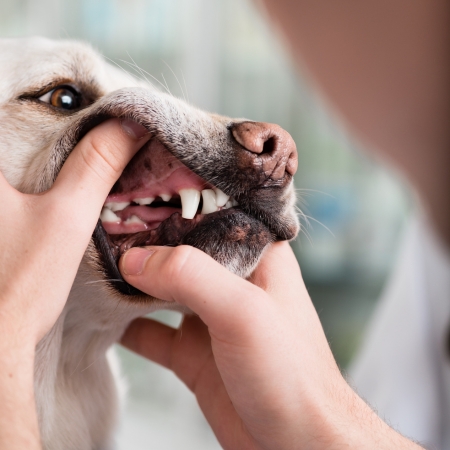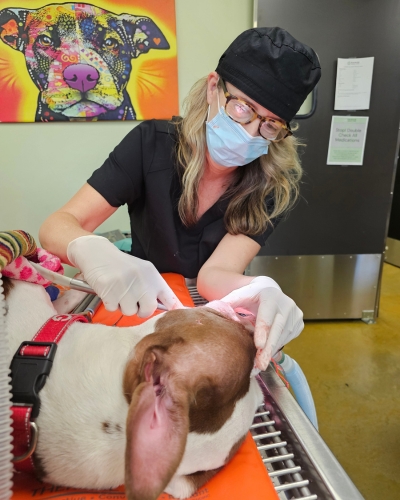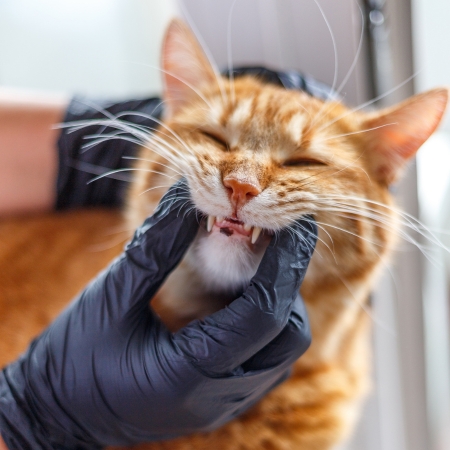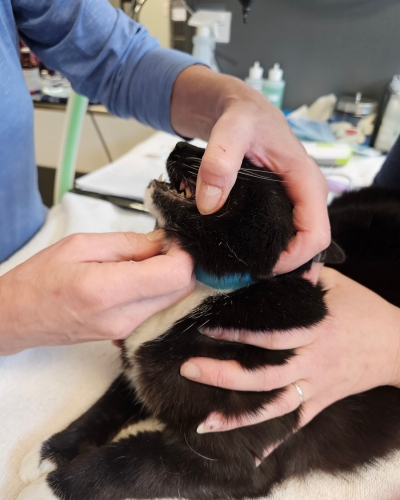Maintaining your pet’s dental health is one of the most important things you can do to maintain their overall health. Neglecting your pet’s dental health not only threatens their well-being but can also have a significant impact on your wallet. A 2013 study by the Veterinary Pet Insurance Co. indicated that the average cost of preventing dental disease in pets is a mere third of the average cost of treating it.
Dental Care
An unpleasant odor from your dog or cat’s mouth could indicate untreated dental issues that might result in severe conditions, such as periodontitis or even heart disease, if not addressed. By ensuring that your pet undergoes regular cleanings, you can prevent the onset of periodontal disease and save money in the long term.
Maintaining your pet’s dental health is one of the most important things you can do to maintain their overall health. Neglecting your pet’s dental health not only threatens their well-being but can also have a significant impact on your wallet. A 2013 study by the Veterinary Pet Insurance Co. indicated that the average cost of preventing dental disease in pets is a mere third of the average cost of treating it.
An unpleasant odor from your dog or cat’s mouth could indicate untreated dental issues that might result in severe conditions, such as periodontitis or even heart disease, if not addressed. By ensuring that your pet undergoes regular cleanings, you can prevent the onset of periodontal disease and save money in the long term.

Why Dental Check-ups Are Important for Pets
Sadly, our pets cannot tell us when they are having an issue or are in pain from an existing dental problem. This is one of the reasons that regular preventive pet dental visits are so important.

Why Dental Check-ups Are Important for Pets
Sadly, our pets cannot tell us when they are having an issue or are in pain from an existing dental problem. This is one of the reasons that regular preventive pet dental visits are so important.
Unless you notice signs of dental pain or distress, some of your pet’s mouth issues might not be recognized for quite some time. This puts your pet in a serious situation that could lead to more problems like dental disease. If left untreated, dental disease can travel through the bloodstream and cause fatal issues like heart, liver, and kidney disease.
Symptoms
A comprehensive oral examination can uncover unsuspected health problems. Even if your pet doesn’t have bad breath, they could be suffering from dental issues that are difficult to identify without a thorough veterinary examination. Make an appointment for a dental checkup if you notice any of the following symptoms:
- Bad breath
- Damaged or loose teeth
- Teeth that are discolored or coated with tartar
- Unusual chewing, drooling, or dropping food from the mouth
- Decreased appetite or refusal to eat
- Discomfort in or around the mouth
- Bleeding from the mouth
- Swelling in the regions around the mouth
The experienced team at Lynnwood Animal Hospital will perform a thorough examination to ensure your pet’s health is at its peak.
We’ll also demonstrate how to brush your pet’s teeth between examinations, which is the most effective way to maintain dental health between professional cleanings.

Symptoms
A comprehensive oral examination can uncover unsuspected health problems. Even if your pet doesn’t have bad breath, they could be suffering from dental issues that are difficult to identify without a thorough veterinary examination. Make an appointment for a dental checkup if you notice any of the following symptoms:
- Bad breath
- Damaged or loose teeth
- Teeth that are discolored or coated with tartar
- Unusual chewing, drooling, or dropping food from the mouth
- Decreased appetite or refusal to eat
- Discomfort in or around the mouth
- Bleeding from the mouth
- Swelling in the regions around the mouth
The experienced team at Lynnwood Animal Hospital will perform a thorough examination to ensure your pet’s health is at its peak.
We’ll also demonstrate how to brush your pet’s teeth between examinations, which is the most effective way to maintain dental health between professional cleanings.

Dental Diseases
Like humans, cats, dogs, and pocket pets can develop dental problems as they age. When animals age, they may experience such issues as bleeding gums, broken or discolored teeth, loose teeth, or periodontal disease. By taking care of your pet’s teeth from a young age, you can help prevent dental diseases and maintain their oral health.

Dental Diseases
Like humans, cats, dogs, and pocket pets can develop dental problems as they age. When animals age, they may experience such issues as bleeding gums, broken or discolored teeth, loose teeth, or periodontal disease. By taking care of your pet’s teeth from a young age, you can help prevent dental diseases and maintain their oral health.
At Lynnwood Animal Hospital, we offer a range of dental services for dogs and cats to ensure their teeth and gums remain healthy and strong.
Common Pet Dental Diseases
Pets can suffer from many of the same dental problems as humans, often due to a lack of oral care. With professional dental exams and cleanings, as well as home dental care, you can avoid many of these painful dental issues, including:
- Gingivitis
- Periodontal disease
- Oral tumors
- Tooth infections/abscessed teeth
- Tooth resorption
- Fractured teeth
- Discolored/loose teeth
One of the most significant threats to your pet’s dental health is periodontal disease, which is caused by plaque and tartar buildup on their teeth. If left untreated, this infection can severely damage your pet’s gums, leading to swelling, bleeding, recession, and lack of appetite.
In addition, periodontal disease can weaken the bone structure of their teeth, causing them to become loose and eventually fall out. If not addressed, the infection can enter their bloodstream and pose a risk to their internal organs. The good news is that diligent dental care can treat periodontal disease and save your pet’s teeth.

Common Pet Dental Diseases
Pets can suffer from many of the same dental problems as humans, often due to a lack of oral care. With professional dental exams and cleanings, as well as home dental care, you can avoid many of these painful dental issues, including:
- Gingivitis
- Periodontal disease
- Oral tumors
- Tooth infections/abscessed teeth
- Tooth resorption
- Fractured teeth
- Discolored/loose teeth
One of the most significant threats to your pet’s dental health is periodontal disease, which is caused by plaque and tartar buildup on their teeth. If left untreated, this infection can severely damage your pet’s gums, leading to swelling, bleeding, recession, and lack of appetite.
In addition, periodontal disease can weaken the bone structure of their teeth, causing them to become loose and eventually fall out. If not addressed, the infection can enter their bloodstream and pose a risk to their internal organs. The good news is that diligent dental care can treat periodontal disease and save your pet’s teeth.

How to Prevent Pet Dental Diseases
Professional dental care, including routine dental exams and cleanings, is one of the most effective ways to prevent pet dental diseases. Your veterinarian will carefully examine your pet’s mouth, gums, and teeth for signs of infection and disease.
Dental X-rays can be taken to identify hidden dental issues. The teeth will then be scaled and polished, removing plaque and tartar both above and below the gumline, leaving the tooth surfaces smooth and shiny. Your pet must be under anesthesia during these procedures to ensure their comfort and minimize any pain.
In addition to professional cleanings, we recommend regularly brushing your pet’s teeth at home to control plaque buildup. Dental chews, treats, and water additives can also help maintain your pet’s dental health and keep their teeth bright and healthy.
Caring for your pet’s teeth is an essential part of their overall veterinary care.
How to Prevent Pet Dental Diseases
Professional dental care, including routine dental exams and cleanings, is one of the most effective ways to prevent pet dental diseases. Your veterinarian will carefully examine your pet’s mouth, gums, and teeth for signs of infection and disease.
Dental X-rays can be taken to identify hidden dental issues. The teeth will then be scaled and polished, removing plaque and tartar both above and below the gumline, leaving the tooth surfaces smooth and shiny. Your pet must be under anesthesia during these procedures to ensure their comfort and minimize any pain.
In addition to professional cleanings, we recommend regularly brushing your pet’s teeth at home to control plaque buildup. Dental chews, treats, and water additives can also help maintain your pet’s dental health and keep their teeth bright and healthy.
Caring for your pet’s teeth is an essential part of their overall veterinary care.
We are always available to address your questions concerning about your pet’s dental care. Call (425) 771-6300, email info@lynnwoodanimalhospital.com, or schedule online.
